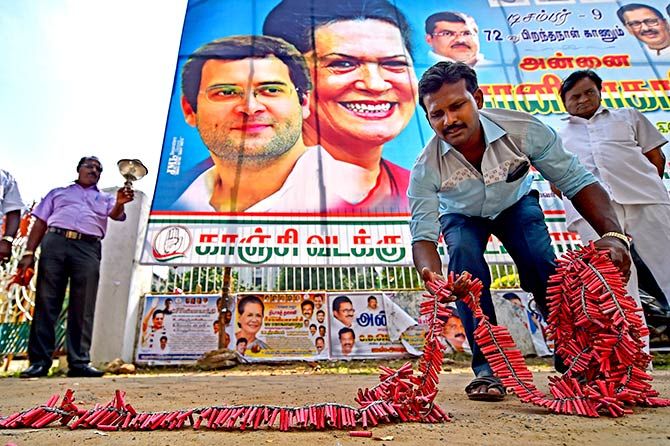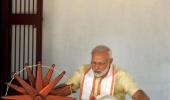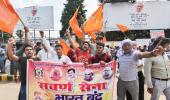Exit polls often go wrong in India because pollsters don't sample voters in the poorest parts of the country or the core support bases of different political parties, explains Professor Atanu Biswas of the Indian Statistical Institute, Kolkata.

The Election Commission was furious with a Hindi daily after it flashed the result of the exit poll after the first phase of the UP assembly election of 2017. Understandably so, because it could have influenced the remaining phases of the election.
In the United States, in 1980, NBC announced Ronald Reagan's victory at 8.15 pm Eastern Time, when it was 5.15 pm on the West Coast, where voting was not yet over. It is possible that many people did not come out to vote hearing the survey result.
However, exit polls have exhibited a disastrous mismatch with the final EVM/ballot counts on numerous occasions in the recent past, all over the world.
Should we then treat exit polls seriously?
Or should a statutory warning be given that they are designed for pure entertainment purposes only, for they are a modern-day comedy of errors?
American pollster Warren Mitowsky is one of the pioneers of exit polls. He organised the first exit poll for CBS News in a local election in Kentucky in 1967.
In exit polls, people are asked about their voting pattern just after the vote is cast, and a specific pattern is followed -- for example, every third or fifth voter.
Meanwhile, if some over-enthusiastic voters want to opine, the surveyor needs to turn them away.
Surprisingly, exit polls have provided hilarious results in many important elections worldwide in the last few decades. It happened in 1992 in Britain. In 2000, the exit polls favoured Al Gore in the decisive state of Florida. The rest is a history of monumental blunders in US elections.
In the 2004 election, the difference in the vote shares of John F Kerry and George W Bush predicted by the exit poll was 6.5 per cent more than the actual! Political analysts and researchers are still struggling to explain this election.
Although almost all the exit polls in the 2014 Lok Sabha election predicted an NDA victory, most of them were nowhere close to the actual tally of 336 seats.
Almost all the surveys in 2009 predicted an NDA win. The rest is history.
In 2004, the exit polls predicted another Vajpayee victory, and the actual number of seats the NDA got was 187 -- a massive error!
Although most of the exit polls predicted a Trinamool victory in the West Bengal assembly election of 2016, very few could predict the party's huge victory.
The assembly election of Bihar in 2015 is a classic example of erroneous prediction.
Exit polls also failed miserably in predicting the massive AAP victory in the Delhi assembly election of 2015.
In today's world, in any election it is common that about half a dozen exit polls would predict the victory of party A, another half a dozen would predict party B's victory, and half a dozen would portray a close scenario.
Exit polls might yield disastrous results for many reasons. The sample size should not be very small. Again, quite often the samples are far from 'random'.
Understandably, polling organisations are in a hurry to publish their results as soon as possible.
Do the surveyors of all these agencies reach the poorest parts and the remote corners of the country?
Do they reach the core support bases of different parties in rural India in appropriate proportions?
Do they reach the sensitive booths of the country which comprise nearly half of total booths?
In many cases, it is likely that the samples are not representative according to the socio-economic classes across religions and races.
Major errors in exit polls may occur due to differences in enthusiasm of the supporters of different parties. John F Kerry was ahead of George W Bush in the exit polls for the 2004 US presidential election, but Mr Bush won.
Many pollsters like Warren Mitofsky believed that it was mainly due to the over-enthusiastic participation of Mr Kerry's supporters in the exit polls.
Traditionally in the US, Republicans have been reluctant to participate in such studies. This is called 'non-response bias'.
In Britain, it is believed that Conservatives have a similar 'shy Tory factor', the phrase originating during John Major's 1992 victory.
The 'shy Trump voters' story became very popular after the 2016 presidential election in the US, although many people didn't agree with this theory as far as Donald John Trump's election is concerned.
According to the 'shy' theory, voters are usually reluctant to admit support for particularly controversial or politically incorrect candidates.
Of course, 'non-response bias' might also occur for different patterns of participation with respect to age, gender, race and caste.
For example, in the US presidential election of 2004, 43 per cent among sixty-plus voters and 55 per cent among younger voters took part in the survey.
Even one-and-a-half decades back, a big difference between the actual result and the exit poll result was sometimes looked upon by some people as evidence of allegations of election fraud, such was the credibility of the exit polls -- be it in Venezuela to take back Hugo Chávez, in the presidential election of Ukraine, or the US presidential battle between John F Kerry and George W Bush, all in 2004. Richard Charinen's book, Proving Election Fraud, might make for interesting reading in this context.
In the 2003 election in Georgia, allegations of fraud were strengthened by the exit poll result, which triggered the 'Rose Revolution' and Eduard Shevardnadze's resignation.
Today's pollsters may like to try and eradicate the ridiculous present-day perception of exit polls. We'd certainly like to watch poll predictions that are a little more serious instead of watching comedy shows!












 © 2025
© 2025